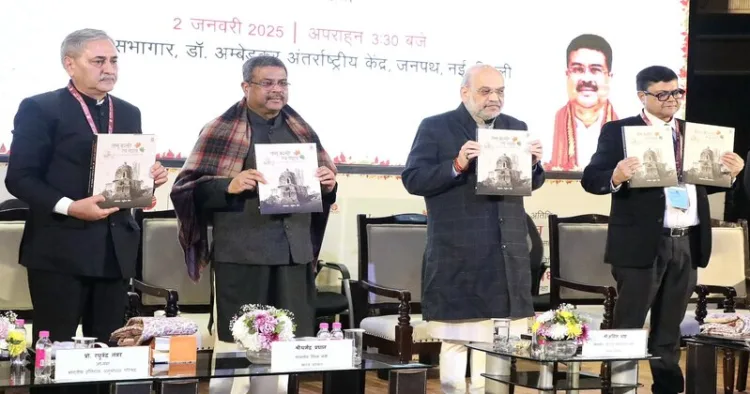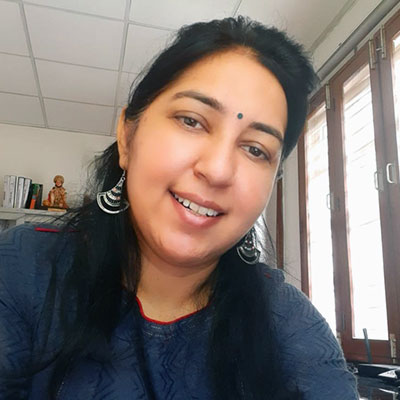NEW DELHI: Union Home Minister Amit Shah, addressed the gathering at the book launch of ‘J&K and Ladakh Through the Ages’ in New Delhi on January 2, 2025. While addressing the gathering, Shah minced no words and stated that Kashmir is and has always been an inseparable part of India.
Shah expressed gratitude to the Indian Council of Historical Research (ICHR) and the National Book Trust (NBT) for their significant contribution in presenting an accurate narrative of J&K and Ladakh’s rich history. Speaking about the book which correctly presented the facts pertaining to J&K, Shah emphasised the importance of correcting distortions that were introduced during colonial rule and later perpetuated to serve political agendas of those who were in power.
देश में एक दौर था, जब दिल्ली के दरीबा से बल्लीमारान और लुटियंस से जिमखाना तक इतिहास को सीमित करके देखा गया। शासकों को खुश करने के लिए लिखे गए इतिहास से मुक्ति पाने का समय आ गया है। pic.twitter.com/sHCC4MNu8P
— Amit Shah (@AmitShah) January 2, 2025
“The historians did what they did but now who can stop us? The nation is free and there is a government that is running according to the country’s views… It is our work now to represent the nation with facts and proof and from our point of view,” he added.
Coming down heavily on the colonial rulers, Shah cleared the air about Bharat’s rich culture and stated that it is the only country in the world that has his own unique geo-cultural identity, rooted in its culture, language, and spirituality. He criticised the colonial narrative that Bharat was never a unified country, asserting that such views stemmed from a lack of understanding of Bharat’s heritage. “Bharat is a geo-cultural nation, and only those who understand its culture can truly understand its essence,” Shah said. He slammed all those who stated that Kashmir was not an integral part of Bharat.
दुनिया का एकमात्र Geo-Cultural देश भारत की सीमाओं का निर्माण उसकी संस्कृति के आधार पर हुआ है। इसे Geo-Political नहीं, Geo-Cultural दृष्टिकोण से ही समझा जा सकता है। pic.twitter.com/nuzaE7FiiH
— Amit Shah (@AmitShah) January 2, 2025
The Union Minister said the book proves that the culture, languages, scripts, spiritual thoughts, artwork at pilgrim places, trade and commerce that was spread across the country was present in Kashmir for at least 10000 years and spread from there to several other parts of the country.
“When 8000-year-old books mention Kashmir and Jhelum, then no one can comment on to whom Kashmir belongs. Kashmir is and has always been an inseparable part of India. No one can separate it using sections of law. Attempts were made to separate it using law but those sections were abrogated in the flow of time and all obstacles were removed,” he said.
Amit Shah on Thursday suggested that the name Kashmir could be derived from sage Kashyap, a revered figure in Hinduism. He said Kashmir is also part of the Buddhist journey with the religion making its way to many countries of the region including Nepal and Afghanistan.
“This book presents all factors in detail. The art in the ruins of old temples proves that Kashmir has been a part of India. Kashmir is also an integral part of the Buddhist journey…the history from Buddhism, to demolished temples, to the use of Sanskrit, to the rule of Maharaja Ranjit Singh, to Dogra reign, to the mistakes made after 1947 and to their rectification, all the 8000 years of history are included in this book
The Home Minister highlighted Jammu and Kashmir’s profound contribution to India’s cultural and historical heritage. He expressed optimism about restoring the cultural glory of Kashmir, emphasizing its deep connection to Indian traditions.
Shah underscored that India’s boundaries are defined more by its cultural unity than its geopolitical lines. He cited references to Shankaracharya, the Silk Route, and Hemis Monastery in Ladakh to illustrate the region’s integral ties to Indian culture. Additionally, he mentioned historical evidence such as the use of Sanskrit in Kashmir and the destruction of temples in Ladakh as indicators of the Valley’s unbroken bond with Bharat.
Criticising Articles 370 and 35A, which granted special privileges to J&K, Shah argued that these provisions had obstructed national unity and development. “There was no majority in the Constituent Assembly for these provisions, which is why they were made temporary. The Narendra Modi-led government removed these tainted provisions, paving the way for Jammu and Kashmir’s development,” he said.
Article 370 provided special status to J&K, allowing it significant autonomy, while Article 35A empowered the state to define “permanent residents” and grant them exclusive rights. Both provisions were abrogated by the Central government in August 2019.
Shah stated that Article 370 had “sown the seeds of separatism” in Kashmir and attributed the subsequent reduction in terrorism to its removal. He also highlighted the region’s growing prosperity, citing increased development and reduced insurgency as evidence of the positive impact of the government’s policies.
जम्मू-कश्मीर भारत का अभिन्न अंग था, है और रहेगा। इसे कानून की कोई धारा नहीं बदल सकती और जिस धारा ने इसे बदलने का प्रयास किया, समय ने उस धारा को ही हटा दिया। pic.twitter.com/JpB3e112iR
— Amit Shah (@AmitShah) January 2, 2025
Shah also added that post the removal of Article 370, PM Narendra Modi led government had allocated Rs 80,000 crore for the development of the two union territories. It is after the removal of Article 370 that we saw record number of tourists visiting Kashmir and there has been a decline of 70 per cent of terror related activities. Shah also highlighted that the it is due to the firm resolve of the Modi government that the eco-system that was ruining J&K has been wiped out. It is the firm resolve of the government that development is taking place and today 4G and 5G is also reaching every nook and corner of J&K. Shah categorically stated that whatever we have lost we would reclaim it and added that Shyama Prasad Mookerjee had said that Kashmir was an integral part of Bharat.
Also present on the occasion was Union Education Minister Dr Dharmendra Pradhan, who while speaking at the launch of the book J&K and Ladakh Through the Ages, emphasized the importance of correcting historical inaccuracies. He highlighted Prime Minister Narendra Modi’s call from the Red Fort to rectify misleading narratives and thanked him and Amit Shah for his guidance in this mission.
Describing Kashmir as the mukut mani (crown jewel) of India, Dr Pradhan underscored the responsibility entrusted to the education department to align historical accounts with factual evidence. He stated that it was a proud moment that the book on J&K was a significant step towards achieving this goal. “This book is an endeavour to set the wrong narrative right. It is based on facts,” he said, reiterating the government’s commitment to presenting an accurate account of India’s rich history.




















Comments